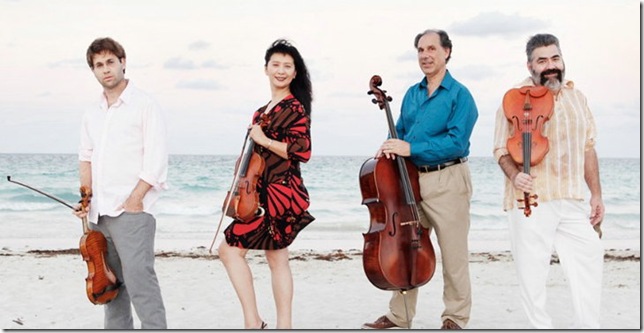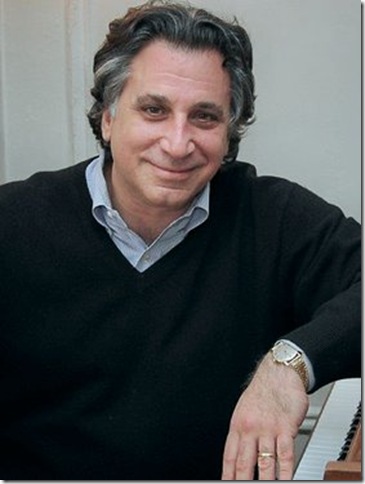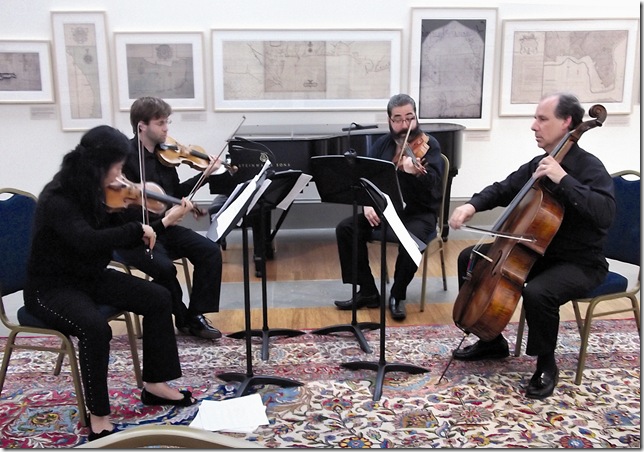It’s been 11 years since the Delray String Quartet was formed and made its first appearance, but only four since its current lineup took shape.
And this one feels like a keeper.
“Like any quartet, you go through lots of personnel changes. Some of the quartets I know have none of the original members,” said Richard Fleischman, the group’s violist. “We went through so many personnel changes before finally, at the end of 2010, we settled in to steady personnel, and that’s when we were able to really do something.
“It’s taken all these years, playing all these concerts and building our repertoire, and coming back to repertoire we’ve played before, that now we can humbly say that we’re starting to play like a quartet,” he said.
And not a moment too soon, because this is going to be a big season, and an even bigger year to come, for the Delray foursome. In addition to its New York debut in April at the celebrated Bargemusic Festival, the group has expanded its exploration of contemporary American music by establishing a relationship with composer Richard Danielpour, who grew up in West Palm Beach.
This past May, the Delrays performed Danielpour’s Fifth Quartet (La Vita Nuova) at the Mainly Mozart Festival in Coral Gables, and for its Jan. 2 and 4 concerts, it will play his Sixth Quartet (Addio), a work that takes an inspirational leaf from Haydn’s Farewell Symphony. In the Sixth’s final pages, the cellist is left alone on stage as the other members depart, though they continue to play offstage.
Danielpour has just completed his Seventh Quartet on commission from the Delrays, and it will include a soprano singing texts from the Book of Psalms, in Hebrew. The fine Israeli soprano Hila Plitmann will be the soloist this coming May in Miami for the world premiere, and the quartet will follow that with three days of recording the Fifth, Sixth and Seventh quartets for Naxos.
[The group’s performance of the Fifth Quartet, recorded this past May at the Mainly Mozart Festival in Coral Gables, can be seen here.]The quartet found its way to Danielpour through composer Kenneth Fuchs, whose Fifth Quartet (American) was commissioned by the Delrays and later recorded by the group on an all-Fuchs Naxos disc. The Fuchs Fifth will be on the program when the quartet plays Bargemusic — a chamber music festival in Brooklyn, founded in 1977, that takes place in a converted barge — on April 3.
“We were looking for more Florida composers because of course we have that great relationship with Ken Fuchs, who is a Florida guy,” Fleischman said. Fuchs, who teaches at the University of Connecticut, grew up in Fort Lauderdale and is a good friend of Danielpour’s, sent him a text telling him about the Delray quartet’s interest.
“By chance, he was in Miami Beach, so I met with him at his hotel, where he was judging the YoungArts competition,” Fleischman said, referring to the Miami-based YoungArts Foundation, which since 1981 has been recognizing and assisting young performers. “We had a lovely talk, talked about a commission, working together, the kind of piece we were looking for, and it was just that simple. It was an instantaneous great relationship.”
The group’s 11th season begins this weekend with performances tonight at Fort Lauderdale’s All Saints Episcopal Church, and on Sunday afternoon at the Colony Hotel in Delray Beach. The program includes the Quartet No. 21 (in D, K. 575) of Mozart, Ravel’s only String Quartet, and an arrangement of music from American composer Bernard Herrmann’s score for Alfred Hitchcock’s 1960 film classic, Psycho.
Hermann wrote the score for string orchestra (partly for budget reasons, apparently), and Fleischman said he’d always wanted to do a string quartet reduction of it.
“We just finished a run-through of it, and it really works,” he said earlier this month after a quartet rehearsal. “I think it will be terrifying. Do you know anyone who can come to the back of the theater and start screaming?”
The Herrmann is part of a tradition with the quartet of playing lighter music along with serious canonical repertoire. Much of this has to do with the group’s patron, Don Thompson, a retired industrialist and off-Broadway producer (The Fantasticks) who originally assembled the group for a party at his home not long after the 2003 demise of the Florida Philharmonic.
Mei Mei Luo, a native of China, has been the first violinist of the Delray String Quartet since then, and is the group’s only remaining original member.
“Don Thompson knew us from (being) on stage at the Florida Philharmonic, and he thought it would be great if he could keep supporting music” after the orchestra went under, Luo said. “So he asked us to his home, and invited a lot of his friends.”
The concert went well, and Thompson moved the group to Delray’s historic Colony Hotel downtown for its first season. “He always wanted to support musicians and music, and for 11 years, he has always been very generous in supporting us,” she said.
Second violinist Tomás Cotik, a native of Argentina who has a solo career of his own that includes discs of music by Schubert (on Centaur) and Piazzolla (on Naxos) with pianist Tao Lin, is the most recent permanent member. Cellist Claudio Jaffé, a member of a prominent Brazilian musical family, has taught at St. Andrew’s School in western Boca Raton as well as performing in area orchestral ensembles and doing solo appearances.
Most string quartets have a core repertory around which they build their programming, and in the Delray quartet’s case, that is late Romantic and contemporary American music, though it does regularly schedule works from the classical canon, such as the Mozart on this weekend’s programs.
“They are crucial pieces, Haydn, Mozart and Beethoven; they established the string quartet techniques, and they are great to play. Playing a Beethoven cycle would be every musician’s dream,” Cotik said. “But for us, it would not be viable because unlike a university (quartet), we couldn’t devote the time to such a project.
“I think at this point, we sound better in Romantic repertoire and in commissioning new pieces, so why should we focus on our weaknesses and not our strengths?” he said.
The quartet’s quest for new music is one of the reasons the Bargemusic concert is so important, Jaffé said.
“For the quartet, I think it represents a couple of things,” he said. “It’s our New York debut, but also, as much as we like to think that we contribute a great deal to the musical world, we know for a fact that because we commissioned that quartet, we were instrumental in contributing something to the repertoire that was very important.
“So we were pretty honored to get called to go premiere it in New York,” he said.
This season’s concerts will include two guests pianists, Lin and Miami-based Marina Radiushina; Lin will perform the Brahms quintet and a true rarity, the quintet of Spain’s Enrique Granados in February, and Radiushina will play the celebrated A major Quintet of Antonin Dvořák in December. David Alsina, an bandoneon player, will join the quartet for music of Astor Piazzolla and Joaquín Turina in March, and those concerts will also feature the Fuchs Fifth Quartet.
Lighter fare will include the Piazzolla, the Hungarian Dances of the 20th-century Czech light-music master Franz Drdla (December) and the Gold and Silver waltz of the operetta composer Franz Lehár (February).
“I think it’s a matter of programming. We’ve always tried to frame the great works with those lighter pieces; it’s sort of like an art gallery: you don’t want to have too many Van Goghs right next to each other,” Jaffé said.
As the quartet’s schedule gets busier, and it looks to performances in Miami (the February concert will be repeated at St. Christopher’s in Key Biscayne) and perhaps Naples, where it has played before, the four veteran musicians will be able to rely on their experience and decades of friendship to move the ensemble forward.
“In a quartet situation, there are strong personalities, people disagree: ‘I think it should be like this, I think it should be like that,’” Fleischman said. “But a lot of times, we know each other so well that there’s less talking, and we kind of read each other’s instincts. With the rotating personnel of the early days, you’re not able to do that; you have to throw things together in three or four rehearsals.
“But now we have the luxury of being able to rehearse more than that, and of having the same people, program after program,” he said.
The Delray String Quartet performs tonight at 7:30 at All Saints Episcopal Church in Fort Lauderdale and at 4 p.m. Sunday at the Colony Hotel in Delray Beach. Music by Mozart, Ravel and Herrmann is on the program. Tickets tonight are $30, and $35 on Sunday. Call 561-213-4138 or visit www.delraystringquartet.com.


